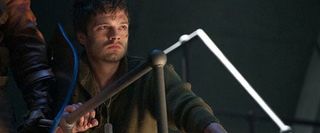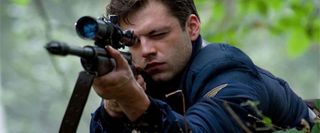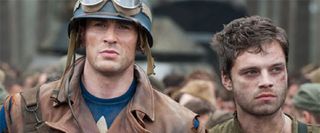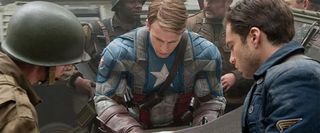Exclusive Interview: Captain America's Sebastian Stan

When Captain America was created by Joe Simon and Jack Kirby in 1941, he was given a sidekick named Bucky Barnes. Much like Robin in the Batman comics, Bucky was a way for younger members of the comic-book reading audience (which is to say most of it) to see themselves in the storyline. This approach, however, would never fly in the 21st century, where fans have used their wallets to demand darker plots and characters instead of campy goofiness. Thusly, the character underwent a massive overhaul in recent years, making him a much more serious character and that’s exactly what Sebastian Stan was asked to do in the Joe Johnston-directed Captain America: The First Avenger.
This past weekend I was given the chance to sit down with the young actor one-on-one to talk about his role in the upcoming Marvel movie, which comes out this Friday. Check out the interview below in which Sebastian Stan talks about Bucky’s relationship with Steve Rogers, the lessons taken and applied from working in film, television and on stage, and his study of those affected by great tragedy and loss.
For starters, there is an incredible amount of secrecy surrounding these films and having to live with it for so long, how do you make sure that you keep it all in?
Well, I feel like, you just show up, you do the job that you were hired for as best as you can, and then there’s a part that you kind of have to just let go and carry on the torch. So I just kind of focus on where I come in, what I have to do.
Do you have a circle of confidants that you express what you’re doing and all that kind of stuff to?
I’m not sure I know what you mean.
Because you obviously can’t really talk about what happens in the movie, so just like in terms of what you’re actually doing, do you have friends and family that you talk to about it?
CINEMABLEND NEWSLETTER
Your Daily Blend of Entertainment News
Oh, yeah, I mean, loosely, in passing or something. But I actually haven’t talked in depth about it. All of my friends actually don’t even want to know, they just want to be able to watch it and see for themselves.
So were you a comic book fan from the beginning?
I am now, I didn’t start out like that because I just didn’t grow up on comic books, so for me it’s just kind of a new thing, and then I was really able to see the appeal in everything because of the movies. It was good to learn about that because it’s real, but it’s also a very heightened world.
When it first started out in the 1940s, Bucky was kind of this goofy, kind of “boy wonder” character. Was that something, did you actually read those issues?
Yeah, I went back because I wanted to know more. You’re right it was a very different take on many levels when it first came out. It’s just been interesting to see how the stories kind of molded with the times and where they’ve taken the story and these characters was definitely really interesting to me. I’m kind of happy that they were able to make a movie about it now because I feel like on a technology level and visually, and just what they do with film now, I think it’s only going cater to a really cool story.

One of the things that comes with changing the character from that 1940s boy wonder character, the sidekick basically, is that in the movie, there’s really kind of a dynamic change between Steve and Bucky. First Steve is kind of this weakling and Bucky goes off to war, but then all of a sudden it becomes, Steve becomes Captain America, basically comes into a position of power, so I’m curious if you could talk about the relationship between those two characters.
Well I think it’s very relatable in a sense, taking away the strange thing that happens to Steve Rogers, obviously between the time when he lasts sees Bucky, I think it’s very relatable in the sense that if you have two people that grow up together in a sense, one feels like he’s the leader, older brother, the other one looks up to him. There’s a certain way that two people like that go out and about and how they handle themselves, like for a long time, Bucky kind of having to look after Steve, kind of feels responsible for him in a huge way, I think the dynamic changes in the sense when he sees Steve be able to take care of himself no matter what he does and suddenly be, like, this man, much stronger, even, on a physical level. I think at first it’s a little weird, to just suddenly kind of switch gears like that. But there’s a right of passage that happens and I think, absolutely their friendship is different. I’m not saying that the care or any of the things that were there before, the feelings that they have for each other will always be there, but Bucky is sort of like, he has to step back and let Steve be this guy now, and I think it’s a little weird. You kind of think, “Well I was the one who knew more about things than you, and now you’re shooting guns and doing all of these things.” On a protective level, that’s kind of where the switch is.
As much as this is a comic book movie, it’s also really a period piece. So I’m curious, in addition to researching the comic, did you kind of learn about that era as well?
Absolutely, that was one of my favorite parts I think. Going back and researching that and the movies that were out at the time, just the overall kind of sentiment that people felt about war. It was much more romantic than it is now. Also just researching music-wise, culturally what was happening, all of that I thought was very important to know about because you just feel responsible to the period, to appear to live in that world.
Also with these period pieces, the set design and the costumes are so amazing. How much did that really help you just bring you into the picture?
Yeah, I mean, the detail on the costumes and the sets and the cars. I think it’s a little harder to work on a green screen sometimes because you really have to have it all in your mind and allow yourself to be very imaginative, but when you have that all around you to work off of, of course it’s much easier. It’s almost like, you’re like a little kid, you live in a fantasy world for a while, it’s just all so real around you.

Joe Johnston kind of has a background in that, because he did The Rocketeer back in 1991, I’m curious, what was it like working with him in that respect?
I was familiar with Joe’s work in the past and I was a little bit in awe of him from his contributions in Star Wars and just having been around these great, huge, iconic movies. It was great, part of it, you’re kind of in awe a little bit, and at the same time you kind of take your place. You got the job and it’s up to you, you’re making a movie together so, he’s the captain of the ship and you follow him. Fortunately I think he had a lot of trust in the actors in the film. That really helped because it allowed us all to kind of be bold with our choices and take risks, and sometimes fail, and sometimes find really nice, different moments.
You also have experience with stage, television, and film, do you find that they all relate to each other? Do you take lessons from each one and apply it to the other?
I think so, I think there’s something you can learn from each medium, absolutely. I’s say from the television medium, you’re always pressed for time, you’re always on the go, on the go, so there’s a kind of an energy thing about that I think trains you a little bit more to just kind of, like, when the time comes, you’re on it. I think it’s also difficult sometimes when you’re waiting around a lot, you want to make sure you want to stay in the world that you’re in so you’re not exerting too much energy. In terms of theater, again it’s one of those things where you don’t have time to stop, you just go. The thing that sticks to me most about theater is that because it’s such an ape crazy nonstop experience, you really don’t have time to think about anything else. You’re just really present, you have to be or else, you know, you can’t stop the play. So I mean I think maybe taking some of that and applying it to when you’re doing a scene, in terms of the focus and being present as much as possible, there’s probably some help from the stage over to movies.
So when you’re doing multiple takes, does that kind of take a toll maybe? Do you eventually just kind of start reciting as opposed to...
Well, the multiple takes is most similar to multiple performances, on stage you just do the same thing every night. Sometimes with films you have a freedom to be able to, Okay, we got that take so let’s try another one where suddenly I’ll say this, or you’ll get to improv. You can’t do that with stage. We have to make it new every time, and also within the structured settings. I think that is a challenge, I think the challenge is once you’ve don’t five or eight takes, sometimes you find things that work and you kind of skip to them, but you have to make it fresh every time, you have to be present every time. I think from the close up to the long shot is how you kind of maintain your energy.

Did you get rehearsal time?
We did, we got together about a month and a half before we started shooting. I had the script so most of the rehearsing I was doing on my own, and then we had some cast get-togethers where we would go on the script and kind of share our opinions. But most of the work we did, I think, individually, and then we’d show up on the day and rehearse certain things. Sometimes you don’t want to get married too much to a lot of rehearsing, I feel, when it comes to film, because there’s so many technicalities. So if I’m in my head, I’ve gotten settled on something, I’m gonna have to change it if I get there and something was set that’s completely different. The action could be moving across the set, so you kind of try and mold to, you stay open to when you get there on the day and see what you’re dealing with.
What was the training process like?
Obviously for me it wasn’t as crucial as it was for Chris. I just made, personally I focused on having energy and stamina and being as flexible as I could. Instead of getting necessarily bigger, I was just working on a lot of circuit training, sort of physically, in the gym, and then running, mostly things like that were helpful.
Did you ever go through ballistics training at all? Did you have to learn how to shoot a gun?
Oh yeah, that was a given. We had some military advisors, which were really helpful. There is a way that you hold a gun. Personally, I was always holding onto the gun, even though we weren’t shooting, if it was a day where I had to use a gun, I would just constantly be practicing with it or taking it apart and putting it back together. The thing about these guys is that they were with their guns at all times so their guns became a part of them in some ways. So in the amount of time that we had, we were hoping for that same effect.

When you saw the script, I know that you originally tried out for the lead role of Captain America, what was it that you felt actually, what was it that you really liked about it?
About the audition process?
Just about the script in general. Did you get a copy of the script?
I didn’t have a copy of the script. I think what essentially jumped out to me literally was the period, I had my ideas growing up about what I read in Ernest Hemingway books and movies about World War Two, just the whole romantic idea about it. I thought the period thing was really neat. I guess what really, even from the scenes I was auditioning for, I really related to, I understood Steve’s point of view and the yearning that he had for wanting so badly to contribute to something and not be fading in the background. I understood that feeling. And I think on Bucky’s level I understood the feeling of how much is riding on his coattails because he feels responsible that a life, which is Steve Rogers’ life, is on his hands. So what would happen, hypothetically, if that guy died on his watch? I related to those issues and that spurred a lot of interest in me in parts.
What I really find interesting is, this also comes from the origin of the character itself, there’s ridiculous, the patriotism, it’s about fighting for your country and doing what’s right and fighting against the forces of evil, but in the post-Vietnam/post-Iraq world era, you begin to really, there’s a sense to kind of question how far you actually go. I was wondering if you could talk about that aspect of the film.
Well that was part of the thing, I thought we wanted to make sure that was very real to audiences today. I think the idea of war back then was very different and those guys wanted things for different reasons than there are today. There was a whole lot more patriotism. I think that we’ve been educated a lot about war, obviously in the last couple of decades, what’s been happening since the 1940s. But I thought it was vital to maintain a raw, real, feeling of Bucky, having been someone that’s seen and experienced pretty traumatic, tragic, sad, sad, things that are consequences of war. While he did grow up with that same idea, you know, to be like his father and seeing his father die in an accident, his father being in the military and wanting to kind of live up to this thing that he’s grown up with, and then the conflict of like, he goes over there and he sees what he sees, and he realizes how lucky he is to be alive. Then he comes back and he’s not the same person, he’s not gonna be that happy-go-lucky guy. He’s gonna be someone that questions whether this is necessarily a lived life, whether it’s necessarily as important as it makes it feel. So I thought that that is, in 2011, very real.
Bridging off that, the character does have a dark story and there’s dark elements to the character. Can you talk about maybe accessing him psychologically?
You know, I would say a lot of it had to be very visual for me. That’s why it was helpful to look at a lot of movies and documentaries and so on and hearing interviews with people that have seen things and seeing their eyes, their behavior. I’ve never experienced anything like that so there’s no way for me to relate to it personally. I could find parallels of some sort but they’re never, so what was really helpful to me was if I have specific imagery in my mind about some of these wars, then hopefully just picturing that can hopefully be translated on screen.
Marvel is a very forward-thinking, they always kind of plan ahead. Obviously I don’t want to give too much away, but for starters, what’s your contract situation with the films?
It’s pretty much the same as you’ve heard from some of the other ones. Again, the possibilities are endless and I’ve really enjoyed my experience so far with Marvel, I love what they’ve done with the other films. There’s so much incorporating what they need to be doing in the next couple ones, so the options are obviously open and I like this character a lot, but I’d like to see him come back the way he’s been brought back in the comic books.
Has there been any discussion about a Winter Soldier storyline at all?
I was informed and educated about that before I signed up for the movie, so that’s obviously a possibility, as always. Many other storylines are possible in the comic books.

Eric Eisenberg is the Assistant Managing Editor at CinemaBlend. After graduating Boston University and earning a bachelor’s degree in journalism, he took a part-time job as a staff writer for CinemaBlend, and after six months was offered the opportunity to move to Los Angeles and take on a newly created West Coast Editor position. Over a decade later, he's continuing to advance his interests and expertise. In addition to conducting filmmaker interviews and contributing to the news and feature content of the site, Eric also oversees the Movie Reviews section, writes the the weekend box office report (published Sundays), and is the site's resident Stephen King expert. He has two King-related columns.

‘I’ve Loved The Reaction We’ve Gotten’: X-Men ’97 Directors Open Up About Latest Episode’s Heartbreaking Death And The Tragedy On Genosha

Will Smith, Reba McEntire And Martin Lawrence Had A Fun Exchange Thanks To The Appearance Of A Certain Tee At A Bad Boys 4 Photoshoot

Austin Butler Is Still Going Strong Post-Dune 2, Has Lined Up A Cool Crime Movie With Some Challengers Talent
Most Popular




